|
|
|
Sort Order |
|
|
|
Items / Page
|
|
|
|
|
|
|
| Srl | Item |
| 1 |
ID:
164952
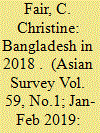

|
|
|
|
|
| Summary/Abstract |
Sheikh Hasina stole victory in the December 2018 election by hobbling the opposition, stifling criticism, stacking the courts and election commission with her lackeys, using a “war on drugs” to target rivals, and co-opting Islamists. Meanwhile, a million immiserated Rohingyas, who fled Myanmar after a brutal crackdown, still languish in desolate camps.
|
|
|
|
|
|
|
|
|
|
|
|
|
|
|
|
| 2 |
ID:
133712
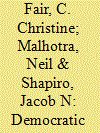

|
|
|
|
|
| Publication |
2014.
|
| Summary/Abstract |
A long-standing research tradition on political culture argues that greater support for core liberal values leads to a rejection of destructive political activities and reduced support for violent politics. In this vein, many contemporary analysts of security policy contend that a lack of democratic values in the Middle East promotes the development of violent political organizations. Unfortunately, there have been few direct tests of the hypothesis that an individual's rejection of democratic values correlates with support for militant groups. We conduct such a test in Pakistan using an original 6,000-person provincially representative survey. We find that strong supporters of democratic values are actually more supportive of militant groups and that this relationship is strongest among those who believe that Muslim rights and sovereignty are being violated in Kashmir. This is consistent with the context of Pakistani politics, where many militant groups use the principle of azadi (i.e., freedom and self-determination) to justify their actions. These results challenge the conventional wisdom about the roots of militancy and underscore the importance of understanding how local context mediates the influence of civic culture on political stability and violence.
|
|
|
|
|
|
|
|
|
|
|
|
|
|
|
|
| 3 |
ID:
167956
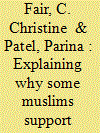

|
|
|
|
|
| Summary/Abstract |
C. CHRISTINE FAIR and PARINA PATEL examine why some Muslims support Islamist political violence. They find, among other things, that those who were more exposed to Islamist violence as well as those living in countries with larger Muslim populations were more supportive of political violence.
|
|
|
|
|
|
|
|
|
|
|
|
|
|
|
|
| 4 |
ID:
164854
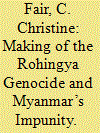

|
|
|
|
|
| Summary/Abstract |
“Myanmar has consolidated its impunity, making its crimes a fait accompli. To do so, it first destabilized the legitimacy of the Rohingya as a group…
|
|
|
|
|
|
|
|
|
|
|
|
|
|
|
|
| 5 |
ID:
182872
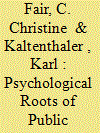

|
|
|
|
|
| Summary/Abstract |
KARL KALTENTHALER and C. CHRISTINE FAIR explore the sources of public sympathy in Pakistan for Lashkar-e-Tayyaba. They argue that the most common and widely distributed factor influencing individual sympathy with a militant group is the expectation that the militant group will bestow a sense of personal significance on that individual.
|
|
|
|
|
|
|
|
|
|
|
|
|
|
|
|
| 6 |
ID:
172986
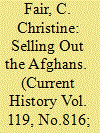

|
|
|
| 7 |
ID:
163211
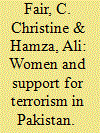

|
|
|
|
|
| Summary/Abstract |
While there have been many scholarly inquiries about the sources of support for terrorism among Muslim publics, to date, scholars have generally not asked whether or not gender predicts support for Islamist militancy. Instead, most scholars and officials assume that “men of military age” are the most important segment of interest. Instead, gender is usually treated as a “control variable” rather than a “study variable,” reflecting the paucity of interest in this subject. This is likely an important scholarly and policy-analytic oversight. Many terrorist groups have women’s wings and women-oriented publications and other outreach programs because they understand the important role that mothers, wives, and sisters play in a male family member’s decision to take up arms with a terrorist group. In some conflicts, women also join as combatants. In this paper, we seek to address these scholarly lacunae by examining gender-wise support for two militant groups based in and operating from Pakistan: the Afghan Taliban, which has no female outreach program, and the sectarian Sipha-e-Sahaba-e-Pakistan, which does. We leverage a dataset drawn from a relatively large national survey of Pakistanis collected in 2011 to model support for these groups using gender as an independent variable along with other demographic and control variables. We find that females are significantly more likely to support the sectarian group with a women’s outreach-wing. In contrast, there is no significant gender effect on support for the Afghan Taliban. We argue, from these results, that gender deserves more attention in understanding who supports and participates in Islamist militancy.
|
|
|
|
|
|
|
|
|
|
|
|
|
|
|
|
|
|
|
|
|